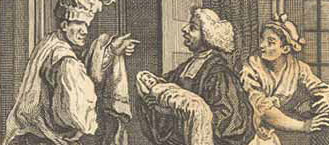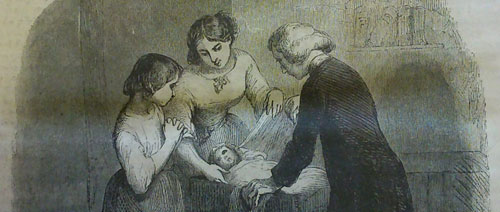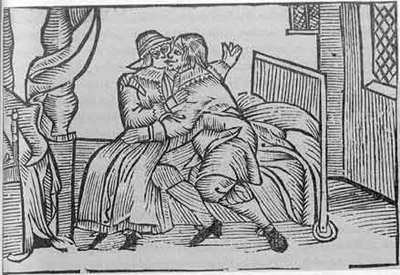
Most of the children who appear in Dedham‘s baptism register in the early/mid-eighteenth century are born to married parents, with only a few illegitimate children. The vicar gives us extra information for some of the illegitimate children, which show us some rather interesting family arrangements and in one case how marriage law has since changed.
“Living with”
On 12th January 1725/6, a little boy called Daniel was baptised in Dedham. The note in the register says he was:
Daniel of Daniel Fairs of Suffolk, a Bastard Child born here of the body of Lingwood Ponder living with George Cock.
Lingwood is an unusual first name for a woman, as I tend to find it’s male children given surnames as first names, so I had to read this a couple of times to make sure that Lingwood is the mother – “born here of the body of” indicates this.
“Living with” might indicate that Lingwood was George Cock’s lodger, servant or relative, but it might equally mean that they were living together out of wedlock, but co-habiting was unusual when marriages were easy to arrange and socially acceptable.
George appears in the register as the father of three children in the baptism register between 1718 and 1721 (George himself was possibly baptised in Dedham in 1698). His wife was called Susanna. If Lingwood was George’s co-habiting partner then she must have had a liaison with Daniel Fairs “of Suffolk” then moved in with George while pregnant. If she was George’s lodger, servant or relative then she could have fallen pregnant while living at George’s house, as Suffolk is just up the road if you’re in Dedham – Daniel Fairs might have paid her a visit.
It’ll be interesting to see if anything else in the register throws more light on this – a burial of George’s wife Susanna and a subsequent marriage between George and Lingwood perhaps.
Incest that’s not incest anymore
On 26th July 1726, the register records the baptism of:
Michael of Michael Crow and Sarah Crow his own Brothers Widow – born in Incest.
Today in Britain, Michael and Sarah’s relationship wouldn’t be viewed as incest, but it would’ve been in the “prohibited degrees of marriage” until as recently as 1921, when The Deceased Brother’s Widows Marriage Act came into force – a necessary change in legislation following the First World War when so many women had lost their husbands. Some unmarried men felt that marrying their brother’s widow and helping to raise their nieces and nephews was the right thing to do (and hopefully some of them were in love, too!). In 1907, The Deceased Wife’s Sister Act had been passed, so over a decade later the opposite Act was well overdue.
English law, based on Biblical teaching, said that one’s in-laws became as one’s blood relatives, hence a man couldn’t marry his brother’s widow because it was seen as incest. Rebecca Probert’s Marriage Law for Genealogists covers the prohibited degrees in some detail, and it would seem that Michael and Sarah would not have been able to marry – at least, if they were known to the vicar. Some couples went to distant parishes or even overseas to marry, where they were unknown, but by 1835, when law was passed to tighten up what happened if someone had managed to marry within the prohibited degrees, technically the marriage was void.
So in the 1720s, Michael and Sarah could have gone away somewhere to marry where their relationship as brother- and sister-in-law was unknown, but if they returned to a place where their relationship was known, their marriage could be challenged and rendered void. Instead, they had a child out of wedlock.
It’ll be interesting to see what else turns up in the records – did they move elsewhere so that they could live together as husband and wife, or did they move on and marry other spouses?
Impatience
In June 1725, the daughter of Mr John Prescott (not that John Prescott) and his wife Elizabeth was baptised. Two years later, on 4th September 1727, the register records the baptism of:
Patience a Bastard Child born of Elisabeth Prescott in the long absence of Mr Prescott
Whoops! Perhaps “Impatience” might’ve been more accurate.
I can’t see many records in Essex for people called Prescott, so we’ll have to see if later entries in the Dedham register give us more clues as to what happened. Had Elizabeth got bored and had a fling while Mr Prescott was off on business or work, or was he in the military? Was he overseas? Though I would expect the register to say so if he was a soldier or in the Royal Navy. Had he abandoned Elizabeth and she had formed a new relationship, but was unable to marry her child’s father? With divorce being incredibly rare, requiring an Act of Parliament until 1857, if Mr Prescott had left Elizabeth, she couldn’t remarry.
I’ll post any updates on these families if and when I find out more!


